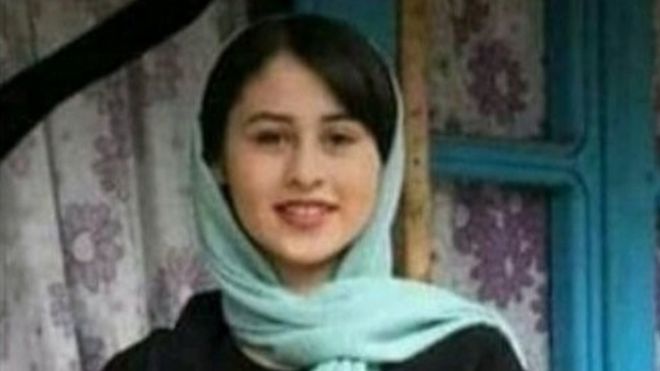
Audio By Carbonatix
Police in northern Iran have arrested a man accused of murdering his 14-year-old daughter in an "honour killing" that has sparked widespread outrage.
Romina Ashrafi ran away from home in Gilan province with her 35-year-old boyfriend after her father objected to their marriage, local media said.
The pair were found by police and Romina was sent home despite reportedly telling them she feared for her life.
Last Thursday night, she was allegedly attacked by her father in her bedroom.
News outlet Gilkhabar.ir reported that Romina was "decapitated" with a sickle, and that afterwards the father walked outside the house "with the sickle in his hand and confessed".
On Wednesday, a number of national newspapers highlighted Romina's story on their front pages.
"Insecure paternal home", read the headline in the pro-reform Ebtekar, which lamented the failure of existing legislation to protect women and girls.
Meanwhile, the Persian hashtag #Romina_Ashrafi has been used more than 50,000 times on Twitter, with most users condemning the killing and the patriarchal nature of Iranian society in general.
Shahindokht Molaverdi, a former vice-president for women and family affairs and the current secretary of Iran's Society for Protecting Women's Rights, wrote: "Romina is neither the first nor will she be the last victim of honour killings."
She added that such murders would continue "as long as the law and dominant cultures in local and global communities are not deterring enough".
4-As long as the current laws discriminating against girls and empowering abusive parents exist, unfortunately the cycle of violence will continue. Iran will see more Ruminas and Atefehs tragically killed by their fathers. This cycle of violence needs to end
— Masih Alinejad 🏳️ (@AlinejadMasih) May 26, 2020
Iran's Islamic penal code reduces punitive measures for fathers and other family members who are convicted of murder or physically harming children in domestic violence or "honour killings".
If a man is found guilty of murdering his daughter, the punishment is between three and 10 years in prison, rather than the normal death sentence or payment of diyeh (blood money) for murder cases.
There are no statistics on the prevalence of "honour killings" in Iran, but human rights activists reported last year that they continued to occur, particularly among rural and tribal populations, according to the US state department.
Latest Stories
-
Anthony Joshua’s driver charged over Nigeria crash that killed two
9 minutes -
Joseph Ayinga-Walter: Ode to Melita Happy Kutorkor Antiaye
10 minutes -
Christians usher in 2026 with prayers, declarations and renewed hope
19 minutes -
Ahmed Ibrahim rallies traditional, religious leaders support for peace building
22 minutes -
Bus returning from 31st night prayer kills 2, injures dozens at Assin Dansame
36 minutes -
Political parties must stay out of local governance – Andrew Bediako
36 minutes -
Beyond Witchcraft: Why preparation, not spiritual fear, determines success
37 minutes -
Margaret Korme Tetteh
1 hour -
Sammy Gyamfi’s work at Goldbod in few months would take someone five years – Ato Forson
2 hours -
From Accra to Wuzhen: The Ghanaian schoolgirls making their mark in global AI
2 hours -
Ghana must prioritise value addition to sustain IMF gains – Prof Asuming
2 hours -
Man allegedly poisons girl over GH₵100 after failed attempts to woo her
2 hours -
Jennifer Frimpong: Ghana’s health system faces funding shock, urgent reforms needed
2 hours -
Tighter cocoa supply lifts prices as Ghana records good crop conditions
2 hours -
KAAF University donates to Widows, urges Public to end Discrimination against Elderly Widows
3 hours

